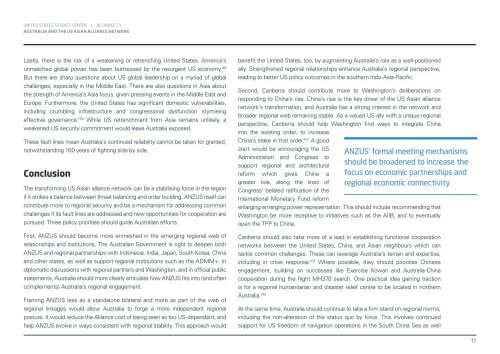ALLIANCE NETWORK
A21AsiaReport
A21AsiaReport
You also want an ePaper? Increase the reach of your titles
YUMPU automatically turns print PDFs into web optimized ePapers that Google loves.
UNITED STATES STUDIES CENTRE | <strong>ALLIANCE</strong> 21<br />
AUSTRALIA AND THE US ASIAN <strong>ALLIANCE</strong> <strong>NETWORK</strong><br />
Lastly, there is the risk of a weakening or retrenching United States. America’s<br />
unmatched global power has been buttressed by the resurgent US economy. 99<br />
But there are sharp questions about US global leadership on a myriad of global<br />
challenges, especially in the Middle East. There are also questions in Asia about<br />
the strength of America’s Asia focus, given pressing events in the Middle East and<br />
Europe. Furthermore, the United States has significant domestic vulnerabilities,<br />
including crumbling infrastructure and congressional dysfunction stymieing<br />
effective governance. 100 While US retrenchment from Asia remains unlikely, a<br />
weakened US security commitment would leave Australia exposed.<br />
These fault lines mean Australia’s continued reliability cannot be taken for granted,<br />
notwithstanding 100 years of fighting side by side.<br />
Conclusion<br />
The transforming US Asian alliance network can be a stabilising force in the region<br />
if it strikes a balance between threat balancing and order building. ANZUS itself can<br />
contribute more to regional security and be a mechanism for addressing common<br />
challenges if its fault lines are addressed and new opportunities for cooperation are<br />
pursued. Three policy priorities should guide Australian efforts.<br />
First, ANZUS should become more enmeshed in the emerging regional web of<br />
relationships and institutions. The Australian Government is right to deepen both<br />
ANZUS and regional partnerships with Indonesia, India, Japan, South Korea, China<br />
and other states, as well as support regional institutions such as the ADMM+. In<br />
diplomatic discussions with regional partners and Washington, and in official public<br />
statements, Australia should more clearly articulate how ANZUS fits into (and often<br />
complements) Australia’s regional engagement.<br />
Framing ANZUS less as a standalone bilateral and more as part of the web of<br />
regional linkages would allow Australia to forge a more independent regional<br />
posture. It would reduce the Alliance cost of being seen as too US-dependent, and<br />
help ANZUS evolve in ways consistent with regional stability. This approach would<br />
benefit the United States, too, by augmenting Australia’s role as a well-positioned<br />
ally. Strengthened regional relationships enhance Australia’s regional perspective,<br />
leading to better US policy outcomes in the southern Indo-Asia-Pacific.<br />
Second, Canberra should contribute more to Washington’s deliberations on<br />
responding to China’s rise. China’s rise is the key driver of the US Asian alliance<br />
network’s transformation, and Australia has a strong interest in the network and<br />
broader regional web remaining stable. As a valued US ally with a unique regional<br />
perspective, Canberra should help Washington find ways to integrate China<br />
into the existing order, to increase<br />
China’s stake in that order. 101 A good<br />
start would be encouraging the US<br />
Administration and Congress to<br />
support regional and architectural<br />
reform which gives China a<br />
greater role, along the lines of<br />
Congress’ belated ratification of the<br />
International Monetary Fund reform<br />
enlarging emerging power representation. This should include recommending that<br />
Washington be more receptive to initiatives such as the AIIB, and to eventually<br />
open the TPP to China.<br />
ANZUS’ formal meeting mechanisms<br />
should be broadened to increase the<br />
focus on economic partnerships and<br />
regional economic connectivity<br />
Canberra should also take more of a lead in establishing functional cooperation<br />
networks between the United States, China, and Asian neighbours which can<br />
tackle common challenges. These can leverage Australia’s terrain and expertise,<br />
including in crisis response. 102 Where possible, they should prioritise Chinese<br />
engagement, building on successes like Exercise Kowari and Australia-China<br />
cooperation during the flight MH370 search. One practical idea gaining traction<br />
is for a regional humanitarian and disaster relief centre to be located in northern<br />
Australia. 103<br />
At the same time, Australia should continue to take a firm stand on regional norms,<br />
including the non-alteration of the status quo by force. This involves continued<br />
support for US freedom of navigation operations in the South China Sea as well<br />
11


